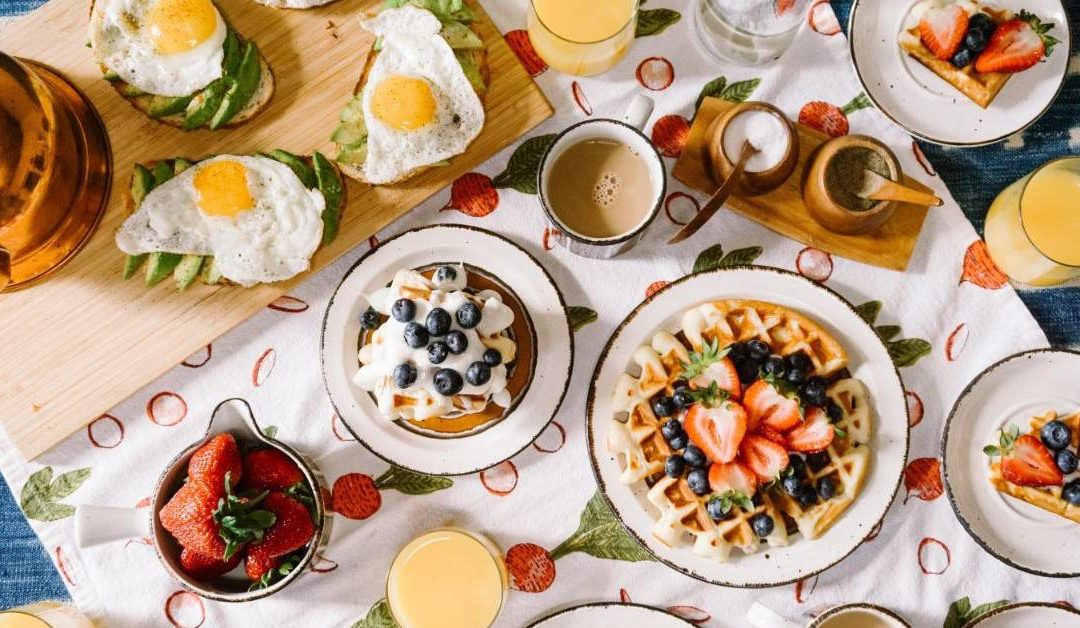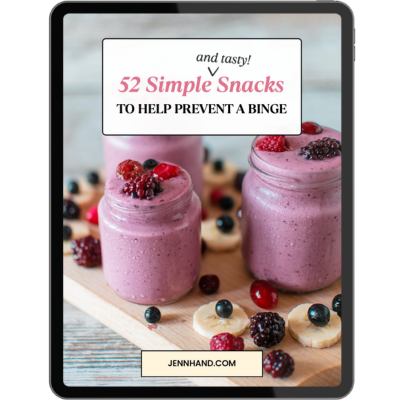What’s the biggest source of anxiety and angst on this path? Feeling obsessed with food. Feeling like every moment of every day is spent planning, counting, scheming, and dreaming of what you can/can’t eat next or feeling like you can’t stop thinking about food.
That’s in the diet phase.
Then, when we’re trying to eat normally, we can shift into the overanalysis of listening to hunger/fullness, trying to figure out what a craving means, thinking about not emotionally eating, etc.
It can be exhausting in either camp!
One of the main reasons I realized I had a problem with food was the moment I thought to myself: I can’t stop thinking about food all damn day. It literally consumes my life.
It surely can’t be “normal” to be eating pancakes for breakfast (on a day I wasn’t dieting), while planning what I could eat for lunch.
And then during my lunch break, getting giddy at the thought of the brownies I could sneak from the break room (because this was an “I can have whatever I want” day).
While driving home from work, I’d be scheming about how I could eat a bowl of ice cream later on that night…
It felt like I spent all of my waking hours thinking about food.
I remember the first thing I told my therapist the day I walked into her office:
“I don’t want to think about food anymore. Just tell me what to do, what to eat and the steps I have to follow to stop this maddening obsession.”
I had spent years dieting and binging and was exhausted from thinking about food all the time.
Her answer surprised me:
“I’m going to ask you TO think about food,” she told me. “You see, we want to keep food at an arm’s length and hold it at a distance. We want to fix it ‘out there’ and then come back to our lives when the problem is solved. But it doesn’t work like that.”
I wanted to run away screaming when she told me that.
But in retrospect, I realized she was right. To heal our relationship with food, we’ve got to think about it. We can’t avoid it.
Here’s the thing I learned over the years:
Food is our mirror. What we do with food, we’re doing in our lives. How we eat is how we live.
If we’re restricting our food, where are we stuffing down desires, hopes, and dreams in our lives?
If we’re ignoring our body’s signals around meals, where are we not listening to those other signs our bodies are giving us? (Leave a toxic relationship, end a career, switch directions, say no, take a rest).
If we’re bingeing and saying “screw it, I can have whatever I want”, where are we overstuffing and not caring for ourselves in other areas?
It’s all related.
And when you begin to think about food and heal your relationship to it, it naturally filters into all other areas of your life.
So, I’m asking you TO think about food.
But think about it in a different way.
Because we ALL think about food.
“Normal” eaters plan meals, check in with their bodies, look forward to a homemade piece of cake, and savor every bite of paella from that authentic Spanish restaurant.
Those of us who struggle think about it in a different way: avoidance, hate, criticism & distain.
The shift to more “normal” eating happens when we begin to think about food as a way to care for ourselves, to fuel our bodies, to find nourishment, and to honor where we are.
We all have to eat 3-5 times a day for the rest of our lives. We may as well begin to pull it in closely and look at our relationship to food.
It’s a challenging notion to accept, especially when we’re convinced we think about food TOO much.
But remember that you can’t separate food from life. It’s all interconnected :
There’s a subtle difference between obsessing over food and thinking about it.
Sure, planning dinners for the week, trying to figure out what your body really wants or prepping some snacks to take with you while you’re out all day isn’t always fun.
(I just said to a client yesterday: I get annoyed meal prepping. But I do it because I KNOW if I don’t, come 6 pm on a Tuesday night, I’ll eat crackers, random snacks, and whatever else I can scrounge up (that’s not satisfying) because I didn’t think about it ahead of time).
If you get curious–if you think about it from a place of curiosity, of getting to know your tastes, preferences and likes, of beginning a relationship with yourself… then it FEELS very different from obsessing about it.
Your Turn:
My challenge to you is this: the next time you find yourself thinking about food in an obsessive way, ask yourself: how can I nourish and fuel my body? How can I allow myself to find pleasure and enjoyment in my food? Experiment and let me know what happens in the comments below 🙂






